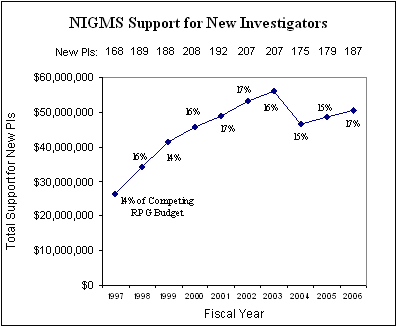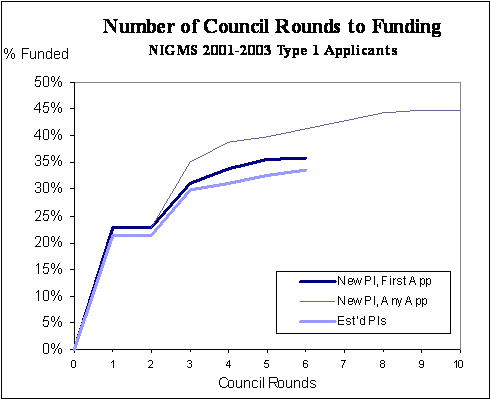In 1998, NIGMS established procedures and funding policies to ensure that adequate numbers of new investigators are supported. Under these policies, an applicant’s status as a new investigator is one of the criteria used in funding decisions made by the Institute—NIGMS staff are encouraged to identify and give special consideration to new investigators. In addition to receiving special consideration for funding, R01 grants to new investigators are awarded for 5 years (instead of the average 4-year award) to allow new investigators additional time to establish their research program.
The number of new investigators supported by NIGMS in recent years suggests that these policies have been effective in maintaining an influx of new NIGMS investigators into the system.
- Since 1997, investigators in their first year of support have been maintained at 5 to 7 percent of all independent investigators supported by NIGMS each year. Historically, this percentage has been sufficient to replace established investigators who leave the pool of NIGMS-supported investigators each year, as recommended in a 1997 report from the NIH Working Group for New Investigators.
- Meanwhile, total support for new investigators has approximately doubled over the period from 1997-2006. This increase is attributable both to providing support through the R01 mechanism, as opposed to the smaller R29 mechanism in use until 1998, and increases in the average size of an R01 grant.

- In a study NIGMS conducted last year, we found that a significant portion of new NIGMS applicants are successful in receiving funding. In 2001 through 2003, 20 to 25 percent of R01 applications from new investigators were funded in the first round (i.e., as original unamended applications). However, including amended versions of those applications, success increased to 36 percent. When funding of any R01 project is considered (not just funding of the original or amended version of the first proposed project), about 45 percent of new applicants in 2001-2003 were funded within three years of their first R01 application to NIGMS. The percentage of these first-time applications that were funded was higher than the percentage of new project applications from established investigators.

- In 2003, the first cohort of new investigators to be supported under these policies became eligible to submit competing renewal applications. The success of these investigators in obtaining grant renewals was high and comparable to that of established investigators.
